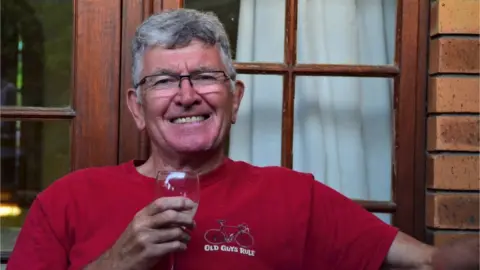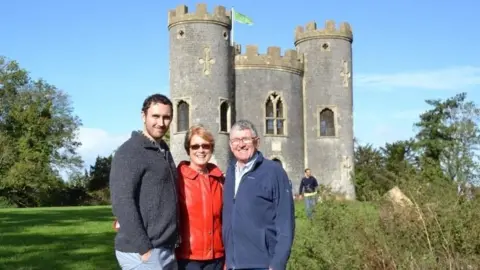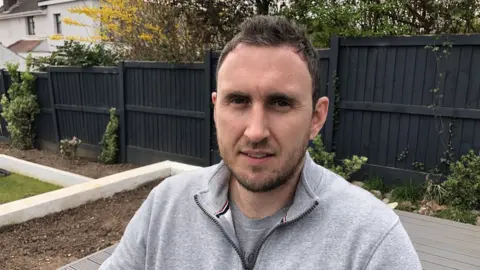Dementia: Amateur rugby player's grieving family warn of risk
The family of a former rugby player is highlighting the risk of dementia related to multiple small head injuries, after he died last year.
Peter Jones developed dementia in his 50s and died aged 71.
A post-mortem examination revealed it was caused by repeated head blows.
His family has joined a class action against various sporting bodies for failing to protect him from the risks caused by concussion. The WRU has been asked to comment.
Mr Jones' son, Lloyd, said: "We need to adapt and make sure people are safe in the future."
Throughout the 1970s, 80s and early 90s, Peter Jones was a force to be reckoned with on the rugby pitch.
He was a powerful physical flanker who took no prisoners.
But tests showed he suffered chronic traumatic encephalopathy (CTE), something that can only be conclusively diagnosed after death.


Mr Jones played rugby for 24 years, starting aged 15 after he left school, soon progressing to play for Neath, Llanelli and as a player coach in Llandeilo.
His son said he was a powerful presence on the pitch: "He was highly physical. He played open side flanker - he was known for his hard tackling and his physicality and also his fitness."
Peter Jones played rugby during the amateur era but Lloyd said his father still received a lot of knocks during games.
"The physicality and the weight of players today is totally different to before, but you'd get away with a lot back in the day as well.
"It's different but there's the same amount of knocks I'd imagine, probably not the same weight but there'd be fighting on the pitch and things like that.
"There's a picture of him in his scrapbook when basically he got his head kicked in on the pitch and had to be stretchered off, and there's a shot of him actually being punched on the back of the head."
After he retired from the game at the age of 39, Jones continued with his carpentry business.
But in his late 50s, he began to forget familiar routes in his car.
He struggled with his memory and walked around the house repeatedly turning off plugs and switches. It took two years for him to be diagnosed with early onset dementia.
Lloyd said he began to connect his father's condition with rugby after watching a film on American football players with dementia.
"It got me thinking, 'Dad's been diagnosed with early onset dementia, that's really bad luck', or 'why at 60? Why him?'
"Maybe that's just the luck of the draw, but with the stories coming out more it was making sense.
"I'd heard about my dad's rugby career and how hard of a hitter he was and things like that and how long he played for as well and it just sort of added up that this could be related."
Peter Jones died in hospital in March 2021 while fighting Covid and other infections.

His family wanted a second post-mortem examination of his brain. This was carried out by Prof Willie Stewart, at Glasgow University, who diagnosed CTE.
Prof Stewart said the lack of any evidence of brain traumas in his life except for his time playing rugby was important.
"Brain injury doesn't appear to be something that stands out, particularly for this gentleman, but what he did do was play a contact sport where we know repetitive head impact is part of the sport," he said.
"The tackle, falling to the ground, it's part of the game and those sports.
"Commonly we see it in football, we see it in American Football and rugby. It's that repetitive head impact on us, as much as any head injuries they might have, that leads to the development of pathology."
Prof Stewart said although it was rare for families of sports people to go public following the diagnosis of CTE, he had "sadly, regularly" seen cases of former rugby players with the condition.
Of those former sports players he has been able to examine who have died with dementia, he said about three quarters have CTE pathology.

"In former professional footballers, their risk of getting dementia is three and a half times higher than it should be in the population.
"We're seeing a very real and a very large risk of dementia in these sports," he said.
"In rugby, all the cases I have seen have been from the amateur era and by no means are the majority of them even elite amateur players, they are everyday club rugby players who loved the game and played for long and enjoyable careers.
"Sadly, as far as rugby is concerned, the pathology we are seeing, this is a problem we are seeing purely from the amateur era at the moment.
"We're just seeing the tip of the iceberg from the amateur era, but there may be a big, big problem from the professional era which we may not know about for another 20 years."
Peter Jones's family has decided to join the class action against World Rugby, the Welsh Rugby Union and the Rugby Football Union for allegedly failing to protect them from the risks caused by concussion.
Former Wales rugby player Alix Popham who has been diagnosed with early onset dementia and probable CTE himself is one of the figureheads of the legal case, which he said was gaining momentum.
"The numbers now are over 200 ex-players and that's from the professional game, amateur players, women, ex-women players as well," said Mr Popham.

"The numbers are growing daily and Lloyd and his family coming forward with this story I think is very brave, but I think it's a message that needs to be out there and people need to take this seriously."
He said Peter Jones's family's decision to talk publicly about the condition was an important one.
"Peter played in the amateur era, from training twice a week and playing, it was unbelievably physical and the CTE is from sub-concussive hits, so the small, little hits. You wouldn't put that together with the amateur era.
"This just shows how important this is and the message and people understanding it and educating about this issue."
Lloyd Jones said he hoped sharing his father's story would help increase awareness of the potential dangers of the cumulative effect of repeated blows to the head over time without sufficient recovery time.
"I'm really quite passionate about the whole subject and wanting to make a difference with my dad's story and his results," said Lloyd.
"Because the more people read, the more change will happen."

- LESSONS FROM LOCKDOWN: How has the experience of lockdown changed us?
- WILD MOUNTAINS OF SNOWDONIA: Five farming families open their gates and share their lives

